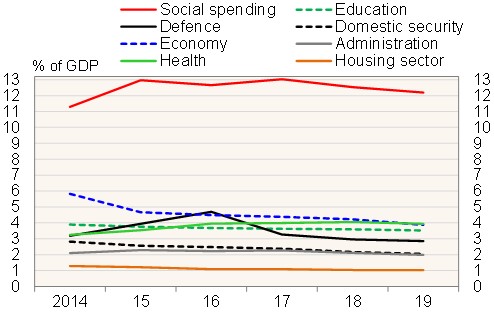BOFIT Weekly Review 44/2016
Russia's special supplement to defence spending also affects next year
In the budget policy framework for 2017‒2019, the finance ministry foresees that defence spending will decrease sharply after this year’s large increase. The draft of this year’s supplemental federal budget, currently before the Duma, sees defence spending rising to its highest level in over 20 years to 4.7 % of GDP. Defence accounts for over 13 % of consolidated budget government spending this year. Spending on domestic security is 6.7 %. The respective shares of federal budget spending are nearly 24 % and 12 %, or almost 36 % combined. There is no reason to add any so-called secret spending of approved budgets to the above draft budget figures as in draft budgets the sum of all main categories adds up to total spending. The Stockholm International Peace Research Institute (SIPRI) estimates that defence spending has for years been roughly one percentage point of GDP higher than presented in official budget data.
The massive supplement to this year’s defence spending is a very special measure. The additional money will go to paying off defence industry bank debts that are guaranteed by the state. Finance minister Anton Siluanov said this enables new borrowing by the companies to facilitate e.g. implementation of the armament programme. For new borrowing, the ceiling on state guarantees for 2016 will increase sharply.
The ministry estimates that social spending will rise to 36 % of total consolidated budget spending. That share would rise even higher without the earlier decision that pensioners who are working no longer receive inflation adjustments to their pensions.
Main categories of government spending (consolidated budget, finance ministry estimates for 2016‒19)

Source: Ministry of Finance.